Overlanding the wild heart of Arabia
(First published in Issue 8, March 2023) As we write this, we are sitting in front of our bus with two non alcoholic beers. Our view is a rock formation in the shape of a camel, at least in Amy’s opinion. Jeroen sees a sea horse, although that seems strange in the middle of the desert. To reach our camp for the night, we had to dig ourselves out twice, as we were once again too lazy to properly deflate our tires. But we are not complaining. Our home on wheels, which we call Mitch, is parked in the middle of the Arabian desert. How we got here is a question we sometimes ask ourselves too, but let us start at the beginning.
We are Amy and Jeroen, two Dutch thirty year olds who decided to take a break after several years of hard work. We wanted to shake things up completely and make the most of having few obligations at home, like a mortgage, children, or other grown up things. We had both done longer backpacking trips before, but this would be our first long journey together. We chose to travel in our own van because the idea of having a fixed base combined with the freedom to go wherever we wanted was simply too tempting. And if we were not already convinced, the occasional vanlife photos on social media looked quite appealing too.
With the motto, I have never done it before, so I think I can do it, we began our search for a van to convert. At first, we thought of buying a Landcruiser because it is reliable, but we soon discovered that it was out of our budget. After weeks of online searching and test drives, we found our dream vehicle, a Mitsubishi L300 4x4 from 1996. It was big enough to live in, small enough to navigate narrow streets, old enough to be repaired anywhere, strong enough for the best off road routes, and most importantly, affordable. In short, it was the perfect van for us.
After fifty days of hard work, with a lot of blood, sweat, and tears, the time had come. We were ready to hit the road.
With almost no wild camping experience and no trial holiday, we began our adventure. Our plan was to travel through the Balkans, Turkey, Iran, the Stan countries, and Mongolia toward Japan. However, we underestimated how much geopolitical events could affect our journey. When we realized that the Russia Ukraine conflict was not going to end soon, we set our eyes on Africa. Our plan was simple. If we could not go north or east after Iran, we would go south. But after a few months, we received news from Ethiopia that the government had introduced an enormous deposit for foreign cars. That closed the route through East Africa as well.
So, somewhat unplanned, we ended up on the Arabian Peninsula for a longer period of time. This was a part of the world that we mostly knew from news reports, often negative ones. Therefore, it was never high on our list of countries to visit. But we are so glad we came. Over the past three and a half months, we traveled through Jordan, Saudi Arabia, and Oman, and each country surprised us in so many ways.
Let‘s start with the Arab people
They are so incredibly warm-hearted and hospitable. An Omani once explained to us that tradition requires welcoming a guest with coffee or tea and dates or fruit, and they take that tradition seriously. We cannot remember a day when we were not welcomed by locals. Sometimes it was a short chat and a photo, but often it turned into a picnic or even an invitation to someone’s home. We spent an evening with Jordanian Bedouins under the stars, eating from a shared plate of rice with camel. We stayed for two days on a farm in Saudi Arabia where we learned how to grow crops in the desert. We shared beers with an Omani overlander who had the best equipped Landcruiser we had ever seen and who shared our dream of driving to Africa. Before arriving, we had some concerns, for example about how people would treat Amy as a Western woman, but surprisingly we had many open conversations about this. Even though norms and values are different from those in the West, we experienced great acceptance and respect for our choices, as long as we respected theirs.
The friendliness of the people was not the only thing that surprised us, so did the nature. Although the peninsula largely consists of sand, our image of the desert as endless dunes was completely wrong. The desert was alive and varied. Driving through the rock formations of Wadi Rum was a completely different experience from crossing the soft sand dunes of the Rub al Khali, the largest continuous sand desert on earth, meaning the Empty Quarter. We discovered many plants and animals, and identifying their tracks became one of our favorite morning activities. The best part of so much open land was the endless number of beautiful wild camp spots, although they required some adjustment. Local Bedouins, true experts, taught us how to make our stay more comfortable. They showed us how to find large pieces of firewood by digging near plant roots, how to level our van by reversing and letting the rear tires dig in, and how to scare away flies using smoke.
Desert Sightseeing
However, every now and then, the amount of sand in the van just drove us crazy. Luckily, there was plenty of old culture to explore on those days. Although Jordan and Saudi Arabia were only founded in the 20th century, the remains of ancient civilizations are well preserved. We saw 10,000 year old carvings on rocks in Jubbah, a massive Greek amphitheater in Amman, and Ottoman style houses in Jeddah. What impressed us most was the legacy of the Nabataeans, a nomadic people who became wealthy trading frankincense and who built their kingdom among the steep rocks of the desert. Their capital, Petra, was a highlight. We left Mitch behind for four days and hiked the last 80 kilometers along the Jordan Trail to reach Petra through the back entrance before opening hours. We were able to admire the monastery completely alone. We also visited Hegra, another Nabataean city in present day Saudi Arabia, which was equally impressive and much less crowded.
The highlights mentioned above are only a glimpse of all the beautiful encounters, impressions, and experiences we had over the last four months. Although we never planned to spend winter on the Arabian Peninsula, we do not regret it for a second. With an average temperature of 25 degrees Celsius (77 degrees Fahrenheit), incredibly hospitable people, countless undiscovered places, and endless wild camp spots, the Arabian Peninsula turned out to be the perfect vanlife winter destination for us.
To find out more about Jordan visit this article: Welcome to Jordan Another overland adventure through the Wadi Rum desert can be found here: Wadi Rum in our Nissan Patrol 4x4


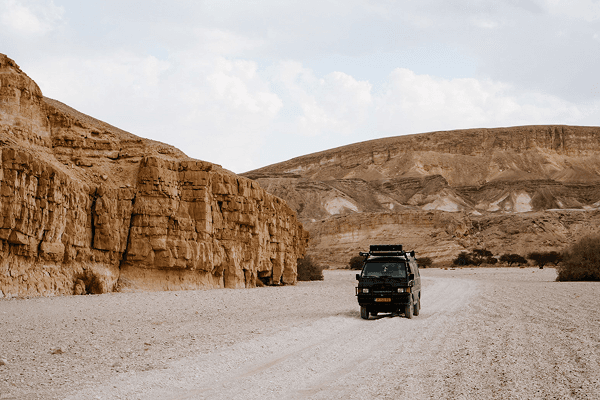
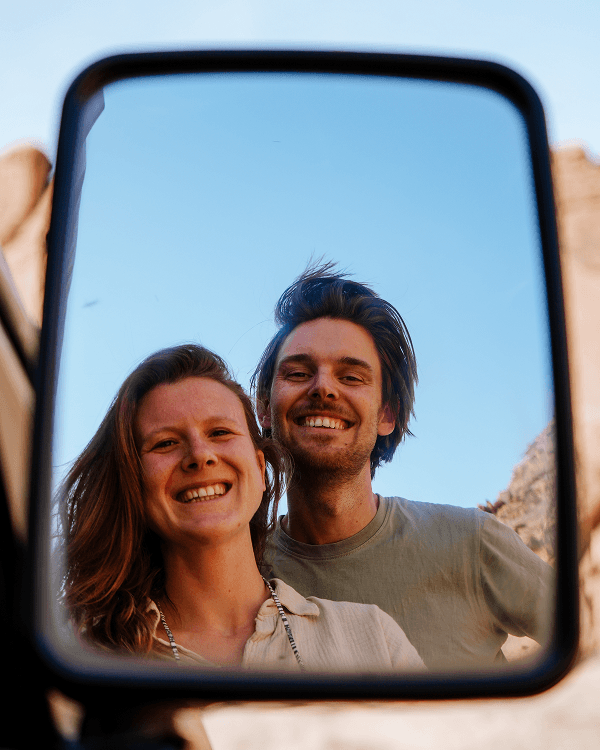
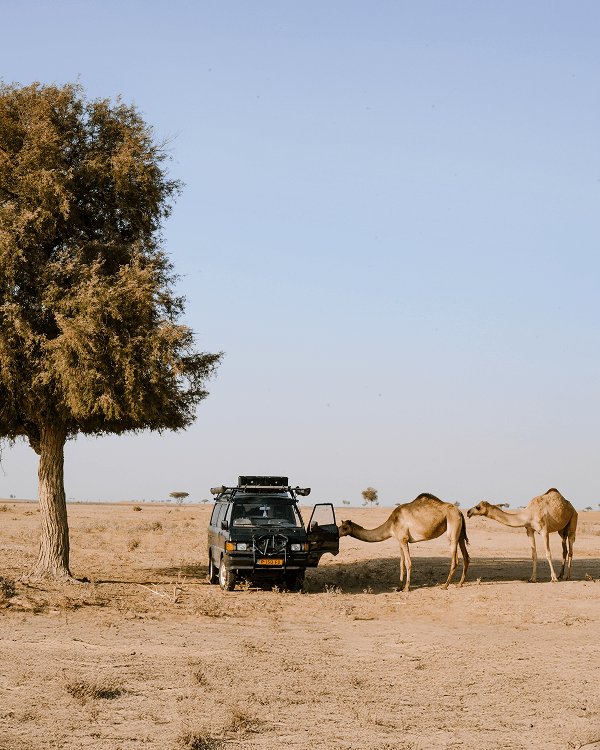
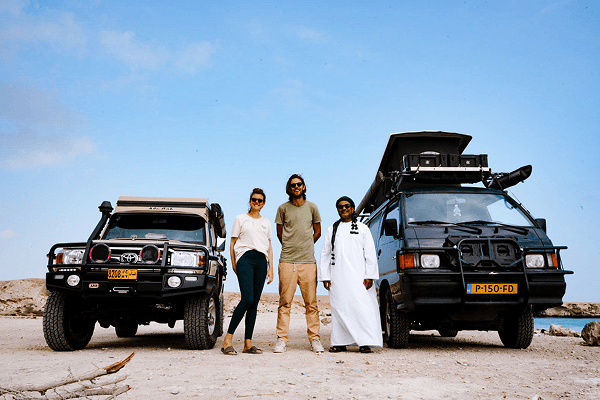
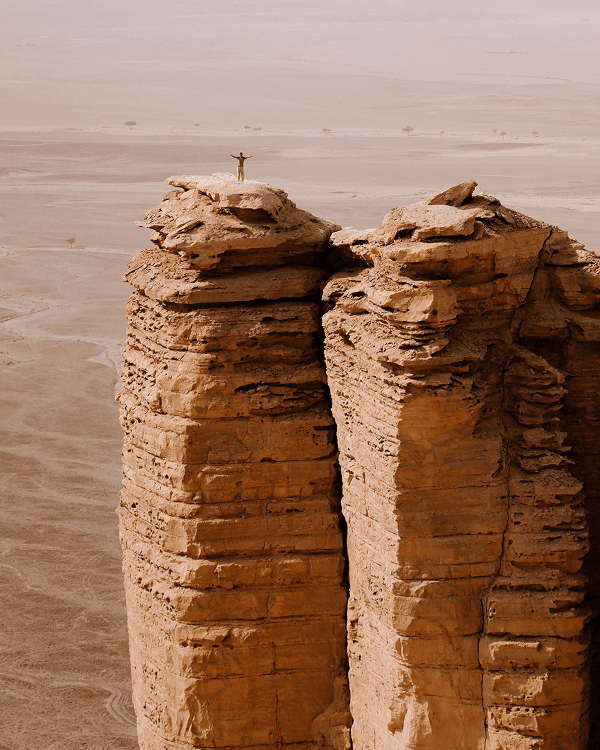
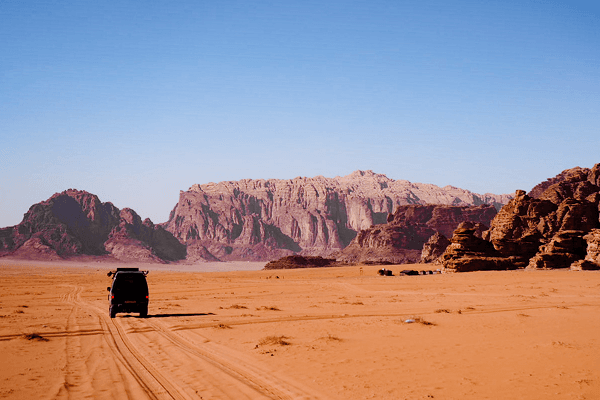
Comments
We love it! Thanks to Amy and Jeroen for sharing this wonderful adventure with us!💛